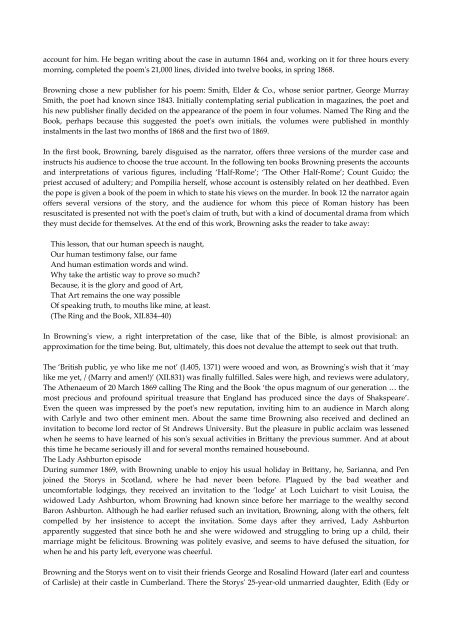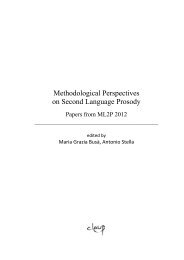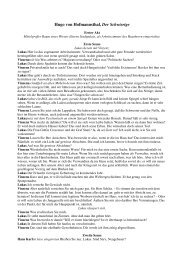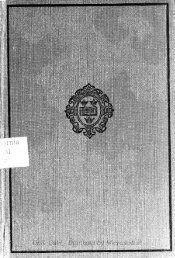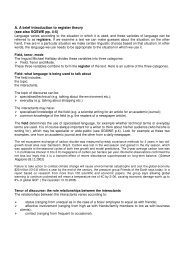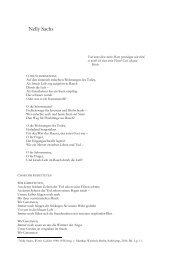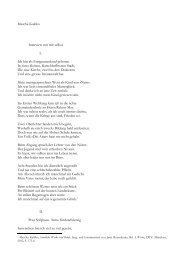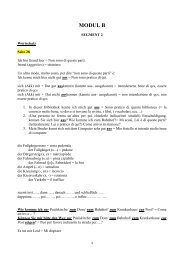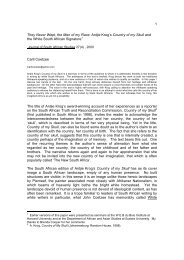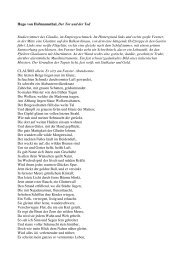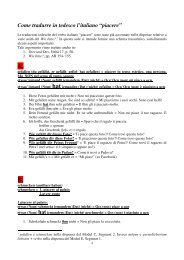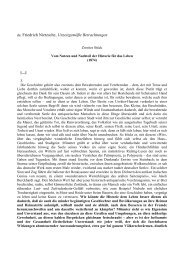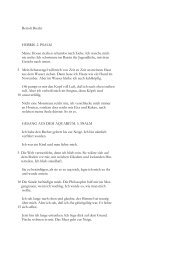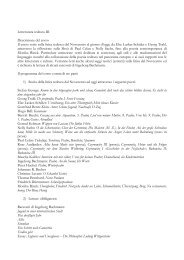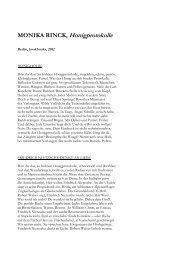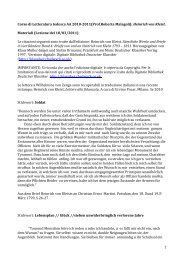The lives of the poets from The Dictionary of National Biography ...
The lives of the poets from The Dictionary of National Biography ...
The lives of the poets from The Dictionary of National Biography ...
You also want an ePaper? Increase the reach of your titles
YUMPU automatically turns print PDFs into web optimized ePapers that Google loves.
account for him. He began writing about <strong>the</strong> case in autumn 1864 and, working on it for three hours every<br />
morning, completed <strong>the</strong> poemʹs 21,000 lines, divided into twelve books, in spring 1868.<br />
Browning chose a new publisher for his poem: Smith, Elder & Co., whose senior partner, George Murray<br />
Smith, <strong>the</strong> poet had known since 1843. Initially contemplating serial publication in magazines, <strong>the</strong> poet and<br />
his new publisher finally decided on <strong>the</strong> appearance <strong>of</strong> <strong>the</strong> poem in four volumes. Named <strong>The</strong> Ring and <strong>the</strong><br />
Book, perhaps because this suggested <strong>the</strong> poetʹs own initials, <strong>the</strong> volumes were published in monthly<br />
instalments in <strong>the</strong> last two months <strong>of</strong> 1868 and <strong>the</strong> first two <strong>of</strong> 1869.<br />
In <strong>the</strong> first book, Browning, barely disguised as <strong>the</strong> narrator, <strong>of</strong>fers three versions <strong>of</strong> <strong>the</strong> murder case and<br />
instructs his audience to choose <strong>the</strong> true account. In <strong>the</strong> following ten books Browning presents <strong>the</strong> accounts<br />
and interpretations <strong>of</strong> various figures, including ‘Half‐Rome’; ‘<strong>The</strong> O<strong>the</strong>r Half‐Rome’; Count Guido; <strong>the</strong><br />
priest accused <strong>of</strong> adultery; and Pompilia herself, whose account is ostensibly related on her deathbed. Even<br />
<strong>the</strong> pope is given a book <strong>of</strong> <strong>the</strong> poem in which to state his views on <strong>the</strong> murder. In book 12 <strong>the</strong> narrator again<br />
<strong>of</strong>fers several versions <strong>of</strong> <strong>the</strong> story, and <strong>the</strong> audience for whom this piece <strong>of</strong> Roman history has been<br />
resuscitated is presented not with <strong>the</strong> poetʹs claim <strong>of</strong> truth, but with a kind <strong>of</strong> documental drama <strong>from</strong> which<br />
<strong>the</strong>y must decide for <strong>the</strong>mselves. At <strong>the</strong> end <strong>of</strong> this work, Browning asks <strong>the</strong> reader to take away:<br />
This lesson, that our human speech is naught,<br />
Our human testimony false, our fame<br />
And human estimation words and wind.<br />
Why take <strong>the</strong> artistic way to prove so much?<br />
Because, it is <strong>the</strong> glory and good <strong>of</strong> Art,<br />
That Art remains <strong>the</strong> one way possible<br />
Of speaking truth, to mouths like mine, at least.<br />
(<strong>The</strong> Ring and <strong>the</strong> Book, XII.834–40)<br />
In Browningʹs view, a right interpretation <strong>of</strong> <strong>the</strong> case, like that <strong>of</strong> <strong>the</strong> Bible, is almost provisional: an<br />
approximation for <strong>the</strong> time being. But, ultimately, this does not devalue <strong>the</strong> attempt to seek out that truth.<br />
<strong>The</strong> ‘British public, ye who like me not’ (I.405, 1371) were wooed and won, as Browningʹs wish that it ‘may<br />
like me yet, / (Marry and amen!)’ (XII.831) was finally fulfilled. Sales were high, and reviews were adulatory,<br />
<strong>The</strong> A<strong>the</strong>naeum <strong>of</strong> 20 March 1869 calling <strong>The</strong> Ring and <strong>the</strong> Book ‘<strong>the</strong> opus magnum <strong>of</strong> our generation … <strong>the</strong><br />
most precious and pr<strong>of</strong>ound spiritual treasure that England has produced since <strong>the</strong> days <strong>of</strong> Shakspeare’.<br />
Even <strong>the</strong> queen was impressed by <strong>the</strong> poetʹs new reputation, inviting him to an audience in March along<br />
with Carlyle and two o<strong>the</strong>r eminent men. About <strong>the</strong> same time Browning also received and declined an<br />
invitation to become lord rector <strong>of</strong> St Andrews University. But <strong>the</strong> pleasure in public acclaim was lessened<br />
when he seems to have learned <strong>of</strong> his sonʹs sexual activities in Brittany <strong>the</strong> previous summer. And at about<br />
this time he became seriously ill and for several months remained housebound.<br />
<strong>The</strong> Lady Ashburton episode<br />
During summer 1869, with Browning unable to enjoy his usual holiday in Brittany, he, Sarianna, and Pen<br />
joined <strong>the</strong> Storys in Scotland, where he had never been before. Plagued by <strong>the</strong> bad wea<strong>the</strong>r and<br />
uncomfortable lodgings, <strong>the</strong>y received an invitation to <strong>the</strong> ‘lodge’ at Loch Luichart to visit Louisa, <strong>the</strong><br />
widowed Lady Ashburton, whom Browning had known since before her marriage to <strong>the</strong> wealthy second<br />
Baron Ashburton. Although he had earlier refused such an invitation, Browning, along with <strong>the</strong> o<strong>the</strong>rs, felt<br />
compelled by her insistence to accept <strong>the</strong> invitation. Some days after <strong>the</strong>y arrived, Lady Ashburton<br />
apparently suggested that since both he and she were widowed and struggling to bring up a child, <strong>the</strong>ir<br />
marriage might be felicitous. Browning was politely evasive, and seems to have defused <strong>the</strong> situation, for<br />
when he and his party left, everyone was cheerful.<br />
Browning and <strong>the</strong> Storys went on to visit <strong>the</strong>ir friends George and Rosalind Howard (later earl and countess<br />
<strong>of</strong> Carlisle) at <strong>the</strong>ir castle in Cumberland. <strong>The</strong>re <strong>the</strong> Storysʹ 25‐year‐old unmarried daughter, Edith (Edy or


